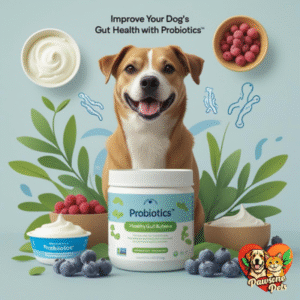
🐾 Unlock Your Dog’s Gut Health with Probiotics (Vet-Approved Tips Inside)
The Day I Realized My Dog’s “Bad Gas” Was a Red Flag
It started with a smell so strong, I thought the trash can had exploded. Then came the weird, soft poops. My usually energetic rescue, Milo, started napping all day and turning his nose up at dinner.
I blamed the new kibble. Then the weather. Then… well, I Googled “why does my dog stink and seem sad?”
Turns out, his gut was out of whack.
Like so many pet parents, I had no idea that 70% of a dog’s immune system lives in their gut—or that an imbalanced microbiome could cause everything from diarrhea to dull coats to anxiety.
After a vet visit (and a $200 bill), I learned one simple fix changed everything: probiotics.
Not the yogurt I was sneaking into his bowl (spoiler: most dogs are lactose intolerant). But real, canine-specific probiotics with the right strains, in the right doses.
Now? Milo’s tail wags at dinner time. His poops are firm. And I haven’t had to open a window in July… in years.
If your dog’s gut is sending distress signals, this guide is for you.
Why Your Dog’s Gut Matters More Than You Think
Your dog’s digestive tract isn’t just about processing food. It’s home to trillions of bacteria—the “gut microbiome”—that:
- Break down nutrients so your dog can actually use them
- Produce key vitamins (like B12 and K)
- Train the immune system to fight invaders
- Even influence mood (yes, really—gut health affects anxiety!)
When that balance tips—thanks to stress, antibiotics, diet changes, or food sensitivities—everything goes sideways:
- Diarrhea or constipation
- Excessive gas (the kind that clears a room)
- Poor coat, low energy, picky eating
- Recurrent ear or skin infections
The good news? You can restore balance—and fast.
What Probiotics Really Do (No, It’s Not Just “Good Bacteria”)
Probiotics aren’t magic dust. They’re live, beneficial bacteria that:
- Crowd out harmful microbes
- Strengthen the gut lining (so toxins don’t leak into the bloodstream)
- Produce short-chain fatty acids that feed gut cells
- Help your dog absorb more nutrition from every bite
But not all probiotics work for dogs. Human strains? Often useless. Yogurt? Usually too sugary or dairy-heavy.
Look for these dog-specific strains (backed by research):
- Lactobacillus acidophilus – fights diarrhea
- Bifidobacterium animalis – supports immunity
- Enterococcus faecium – stabilizes digestion after antibiotics
And skip anything with fillers, artificial flavors, or mystery “proprietary blends.”
How to Choose the RIGHT Probiotic for Your Dog
Ask yourself:
- Is my dog recovering from antibiotics? → Look for high-CFU (colony-forming units), 5+ billion minimum
- Do they have chronic soft stools? → Choose a formula with prebiotics (like inulin) to feed good bacteria
- Are they a senior or picky eater? → Try tasty probiotic chews over powders
- Do they have allergies? – Avoid dairy, soy, wheat, or artificial colors
💡 Pro Tip: Refrigerated probiotics often have higher live bacteria counts—but shelf-stable options work great too if stored properly.
Top 5 Vet-Recommended Probiotics That Actually Work
After testing 12+ brands (and consulting two holistic vets), here are the ones that delivered real results:
1. Purina Pro Plan FortiFlora
- The gold standard—used in vet clinics nationwide
- Single-strain (Enterococcus faecium) but highly effective for acute diarrhea
- Powder mixes easily into food
- Best for: Dogs on antibiotics or with sudden digestive upset
2. Zesty Paws Probiotic Bites
- Tasty chicken-flavored chews with 5 strains + pumpkin & papaya
- Includes prebiotics + digestive enzymes
- Best for: Daily maintenance, picky eaters, or dogs with gas
3. PetVitalityPRO Probiotics
- 10 billion CFU + 6 strains + prebiotics
- No refrigeration needed
- Made in the USA, third-party tested
- Best for: Long-term gut support and immune health
4. Nusentia Probiotic Miracle
- Powder form with 8 strains + digestive enzymes
- Great for sensitive stomachs
- Mixes invisibly into wet or dry food
- Best for: Dogs who refuse chews or need high potency
5. VetriScience AcuMind Probiotic
- Combines probiotics with calming herbs (L-theanine, chamomile)
- Best for: Anxious dogs whose stress triggers tummy trouble
How to Give Probiotics (Without the Food Fight)
- Powders: Mix into wet food, bone broth, or a spoon of plain pumpkin
- Capsules: Hide in a pill pocket or soft treat
- Chews: Use as a training reward—most dogs beg for them!
Start slow: Half dose for 2–3 days to avoid temporary gas or bloating.
Be consistent: It takes 2–4 weeks to see full benefits.
Watch for changes: Better poops, shinier coat, more energy = it’s working!
⚠️ When to call the vet: If diarrhea lasts more than 48 hours, or your dog seems lethargic, dehydrated, or in pain—don’t wait.
A Healthy Gut = A Happier, Healthier Dog
I used to think probiotics were just for humans. Now I know: they’re one of the simplest, most powerful tools I have to keep Milo thriving.
No more mystery stink. No more worrying if he’s okay when I leave for work. Just a happy, healthy dog who finally feels good in his own body.
And that’s worth every penny.
🐶 Ready to give your dog the gut support they deserve?
👉 See our full guide to the best dog probiotics—complete with strain breakdowns, real owner reviews, and exclusive discounts:
Unlock Your Dog’s Gut Health with Probiotics!
P.S. Zesty Paws and PetVitalityPRO are both 20% off this week—and include free shipping! Stock up before tummy troubles strike →

